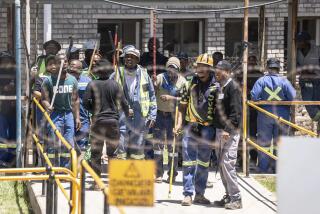Black Labor Leader Dies of Injuries After 2 Days’ Custody in S. Africa
- Share via
JOHANNESBURG, South Africa — A black labor leader, arrested on security charges over the weekend, has died of severe head injuries shortly after his release from two days’ police custody in a case likely to bring renewed charges of brutality against the South African police.
Andries Raditsela, 29, a regional vice chairman of the Federation of South African Trade Unions and a senior shop steward of the Chemical Workers Industrial Union, died Monday afternoon in the neurological ward of Soweto’s Baragwanath Hospital outside Johannesburg shortly after the charges against him were dropped.
The Chemical Workers Union called Tuesday for a full investigation and asked that there be an independent observer at the autopsy.
Union officials voiced suspicion that Raditsela was beaten by police, then denied proper medical treatment in circumstances recalling the 1977 death in detention of Steve Biko, the leader of South Africa’s black consciousness movement.
About 60 blacks have died in the last two decades while detained under South Africa’s sweeping security laws. They permit indefinite detention, without trial and in solitary confinement.
Had Been in Good Health
Raditsela, who had been in good health, was struck across the face by a white policeman when he was detained, initially on suspicion of auto theft, on Saturday morning at Tsakane, east of Johannesburg, according to two friends who were with him. When seen in police custody by his parents three hours later, he was disoriented, unsteady and lapsing into unconsciousness, the union said in a statement Tuesday.
Although police promised to get medical care for him, he could not be found at area hospitals until Monday morning when he was located at Baragwanath, unconscious and in critical condition. He died a few hours later.
On Tuesday, a police spokesman confirmed Raditsela’s arrest on security charges and his subsequent death but could provide no details of his detention. He said these are now part of an official investigation.
Three more deaths were reported Tuesday in the continuing unrest around the country.
At Tsakane, which is 20 miles east of Johannesburg, two men were stoned to death and their bodies doused with gasoline and burned in a battle between residents of the black township and migrant workers housed in hostels there. As many as 2,000 blacks were involved in the fighting, according to police, who said that many were seriously injured. A third man was killed in similar fighting Sunday.
Clash With Migrants
Although the reasons for the fighting at Tsakane were not clear, it reportedly stemmed from incidents Saturday when township youths threw stones at the hostels, igniting longstanding animosity between Tsakane residents and the migrant workers.
At Graaff-Reinet, in troubled eastern Cape province, a black man was killed by 10 others who, police said, “poured a vast amount of soapy water down his throat” in an apparent attempt to force him to participate in anti-government demonstrations. When he still refused, he was stabbed to death, police said.
Most other incidents Tuesday involved stone-throwing and firebomb attacks on government offices, homes of local officials and policemen and delivery vehicles in eastern Cape province and in the black townships around Johannesburg, according to police.
Arsonists also attacked the homes here of two prominent anti-apartheid activists, the Rev. Frank Chikane, a leader of the United Democratic Front, and Aubrey Mokoena, chairman of the Release Mandela Committee, a front affiliate seeking the release of political prisoners. The two men were among those released on bail Saturday pending trial later this month on treason charges.
Although the front, a coalition of 650 groups opposed to South Africa’s apartheid policies of racial segregation, has been feuding recently with the Azanian People’s Organization, another anti-apartheid group, on ideological grounds, both Chikane and Mokoena blamed the firebomb attack on “the system”--that is, the supporters of apartheid, and not on their rivals.
In a bid to end the bitter violence between the groups, the front sent a conciliatory letter to the Azanian People’s Organization urging that “we take decisive action to resolve the conflict.” Front officials also met with Bishop Desmond Tutu, the Nobel Peace laureate, who reported some progress in his weeklong effort to arrange a truce between the groups.
More to Read
Sign up for Essential California
The most important California stories and recommendations in your inbox every morning.
You may occasionally receive promotional content from the Los Angeles Times.













